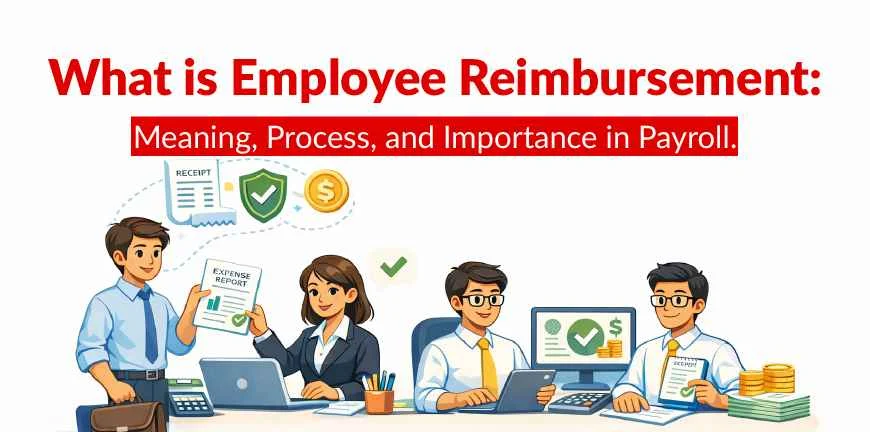
What is Offshore Accounting? Definition, Benefits, Types, Challenges
17/07/2025
What is the Role of AI in Payroll?
18/07/20251. What is payroll?
Payroll is a procedure of calculating and distributing employee compensation by businesses.
2. What is payroll in HR?
Payroll in HR is a method where employee compensation is managed and administered by human resources, which includes salary calculation, tax deduction, etc.
3. What is payroll accounting?
Payroll accounting is a procedure in which all the financial transactions associated with employee compensation are managed and recorded.
4. What is a payroll company?
A payroll company is an external firm that handles the payroll processing tasks of businesses, like calculating employee compensation, taxes, etc.
5. What are payroll services?
Services provided by external firms to manage payroll-related tasks are payroll services. They include the calculation of employee compensation to distributing payments, and many more.
6. What is payroll management?
Payroll management is the method of managing employee compensation, from calculating salaries to deducting taxes to ensuring payments are made on time.
7. What is third-party payroll?
Third-party payroll is an approach where organizations hire an external agency to handle a part or the entire payroll function.
8. How to calculate payroll?
Calculating payroll is a process in which first the gross pay is determined, then deductions of taxes are made, and finally the net pay is calculated.
9. What is payroll management in HR?
The method of facilitating employee compensation entails tasks like calculating salaries, managing deductions and taxes, and ensuring accurate payment on time.
10. What is payroll software?
Payroll software is a computer-generated program that automates the process of calculating, distributing, and managing employee payments.
11. What is a payroll management system?
A software or process utilized to manage employee compensation, like salaries, bonuses, and ensuring timely payments, is a payroll management system.
12. What is the process of payroll in HR?
The process of payroll in HR is compensating employees for their job, which includes calculating salaries, handling deductions and taxes, and dispersing payments.
13. How does payroll work for a small business?
For small businesses, payroll involves managing and calculating employee salaries, deducting taxes, and making exact payments on time.
14. How to outsource payroll?
Outsourcing payroll involves selecting a proper payroll service provider who would help the business with the payroll process.
15. How to process payroll manually?
To process payroll manually, one needs to assimilate employee information, calculate gross pay and deductions, calculate net pay, and then distribute paychecks and file taxes.
16. How does a payroll system work?
A payroll system handles the procedure of paying salaries to employees after calculating them, making deductions, and then disbursing them.
17. How is payroll calculated in India?
In India, payroll is calculated by deciphering an employee’s gross salary after deducting applicable taxes and calculating the net salary.
18. What is a payroll report?
A payroll report is a documentation of the summary of employee compensation and associated financial information for a pay period.
19. Why is payroll so important?
Payroll is critical for both the employer and the employee, as it fosters financial stability in a work environment by accurately processing payments and disbursing them.
20. What is direct payroll?
Direct payroll is a method in which an organization manages its payroll system by itself internally without involving a third party.
21. What is the role of HR in payroll?
HR is responsible for managing employee salaries and ensuring timely payments to employees while complying with company policies and laws.
22. How does payroll outsource work?
Payroll outsourcing is a procedure that involves the participation of an external partner to manage an organization’s payroll systems.
23. How to manage payroll for enterprises?
Payroll for enterprises is essentially managed by gathering employee data, calculating pay, deducting taxes, and distributing payments, while adhering to regulations.
24. What is payroll software?
A computer program automating and handling the employee payment process is payroll software. It manages procedures like calculating salaries, taxes, issuing payslips, and creating payroll reports.
25. What is a payroll management system?
A payroll management system is a streamlined software solution that automates the procedures of calculating and distributing employee salaries accurately, including taxes, deductions, and other financial obligations.
26. What is the process of payroll in HR?
Payroll processing in HR is the calculation and distribution of employee salaries, handling deductions, and complying with tax regulations.
27. How does payroll work for a small business?
For small businesses, payroll involves calculating salaries, cutting taxes, and other financial withholdings, along with the distribution of payments.
28. What does the payroll department do?
The main functions of a payroll department are to accurately calculate and distribute employee compensation, manage deductions and taxes, and comply with the necessary laws and regulations.
29. What is payroll automation?
The integration of software and technology in streamlining and managing payroll processes is called payroll automation.
30. What is the payroll department?
A payroll department is a part of an organization that manages the task of calculating, processing, and distributing employee compensation, like salaries, bonuses, and other benefits.
31. What is payroll? Explain its features
Payroll is the procedure of handling and distributing employee compensation, like calculating salaries, deducting taxes, and making payments to employees. Its vital features entail accuracy, compliance, automation, and employee self-service provisions.
32. What is a payroll statement?
A payroll statement is an elaborate document that highlights an employee’s earnings, deductions, and net pay for a specific pay period.
33. What is the best payroll company?
The best payroll company is Alp Consulting, with its comprehensive payroll structure, robust compliance, and hr management, it is the most sought-after firm in this domain.
34. What is the meaning of a payroll management system?
A payroll management system is a software or method used to handle and automate the calculation and disbursement of employee salaries, entailing tax deductions, benefits, and other associated financial transactions.
35. What are the payroll compliance requirements in India?
Payroll compliance requirements in India refer to complying with regulations and laws like the Payment of Wages Act, the Minimum Wages Act, the Employees’ Provident Fund (EPF) Act, the Employees’ State Insurance (ESI) Act, and other tax laws.
36. What is PF, ESI, and PT in payroll?
In payroll, PF (Provident Fund), ESI (Employees’ State Insurance), and PT (Professional Tax) are statutory cuts that employers need to make from the salaries of an employee, directing it to the relevant authorities.
37. What is Form 16 in payroll?
Form 16 refers to a tax document issued by employers to their employees, serving as a tax deduction certificate on salary payments.
38. How to handle payroll for remote employees?
Payroll management for remote employees requires employers to select the right payroll system, adhere to local tax regulations, and communicate clearly with employees.
39. What are the most important payroll terms to know?
The significant payroll terms commonly used are gross pay, net pay, pay period, deductions, overtime, and statutory compliance.
40. How often should payroll be processed?
The frequency of payroll processes depends on factors like the type of employees, business size, and local laws, etc.
41. What is an EIN, and why do I need one for payroll?
EIN refers to the Employer Identification Number, essential for maintaining seamless payroll compliance and hiring process management.
42. What are payroll deductions, and how do they work?
Payroll deductions are amounts deducted from an employee’s gross pay by their employer to take care of various expenses or obligations.
43. What are the most common payroll mistakes, and how can I avoid them?
Some of the most common payroll mistakes include miscalculating pay, inaccurate tax cuts, misclassifying employees, late payments, and failing to adhere to labour laws. To avoid these errors, you must be accurate in tracking employee hours, use payroll software, and be aware of the evolving regulations.
44. How long do I need to keep payroll records?
Payroll records in India should be kept for a minimum of three years after the last payroll entry, as per the Wages Act. This applies to most payroll-related documents and records.
45. What should a payroll policy include?
The payroll policy should clearly define the compensation system for employees, which includes pay periods, pay rates, overtime, and deductions.
46. How do payroll and HR work together?
HR and payroll departments work hand in hand to handle employee information and compensation, ensuring employees are paid accurately and timely manner while complying with legal formalities.
47. How do I handle payroll for remote or out-of-state employees?
Managing payroll for remote employees needs to be handled with caution ensuring adherence to tax laws and compliance, and determining the applicable state and local taxes, along with making timely and accurate payments.
48. What is the process for correcting payroll errors?
Payroll errors can be corrected by first identifying the mistake, calculating the correct pay, communicating effectively with the affected employee, and implementing the necessary corrections.
49. What are the penalties for payroll mistakes or late filings?
Several penalties can result from payroll mistakes or late filings. These mostly depend on the nature of the error and the governing rules.
50. What are the latest payroll trends or changes in payroll laws?
Payroll is getting influenced by several trends in 2025, like a strong focus on automation, flexibility, and compliance with cloud-based systems and data security.
51. How does third-party payroll work?
Third-party payroll refers to a process where organizations outsource payroll management to a specialized external provider instead of handling it internally.
52. What are the advantages and disadvantages of using third-party payroll services?
The advantages of third-party payroll services are cost efficiency, timesaving, and access to specialized expertise, while the disadvantages entail a lack of control, data security risks, and communication problems.
53. How to choose the right third-party payroll provider?
To select the right external provider, you need to first evaluate your specific needs, based on their experience, compliance expertise, technology, and compare price structures, etc.
Contact Us For Business Enquiry

Yugandhara V. M
Yugandhara V. M serves as the Assistant Vice President – HRO at Alp Consulting Ltd., bringing over 14 years of rich experience in Human Resource Outsourcing, payroll management, and statutory compliance. He specializes in driving process excellence across HR operations, ensuring seamless service delivery and compliance with labor laws. Yugandhara’s expertise lies in managing large-scale client engagements, optimizing HR processes, and implementing efficient workforce management systems that enhance organizational performance. He also leads comprehensive payroll services, ensuring accuracy, timeliness, and compliance for diverse client portfolios.




